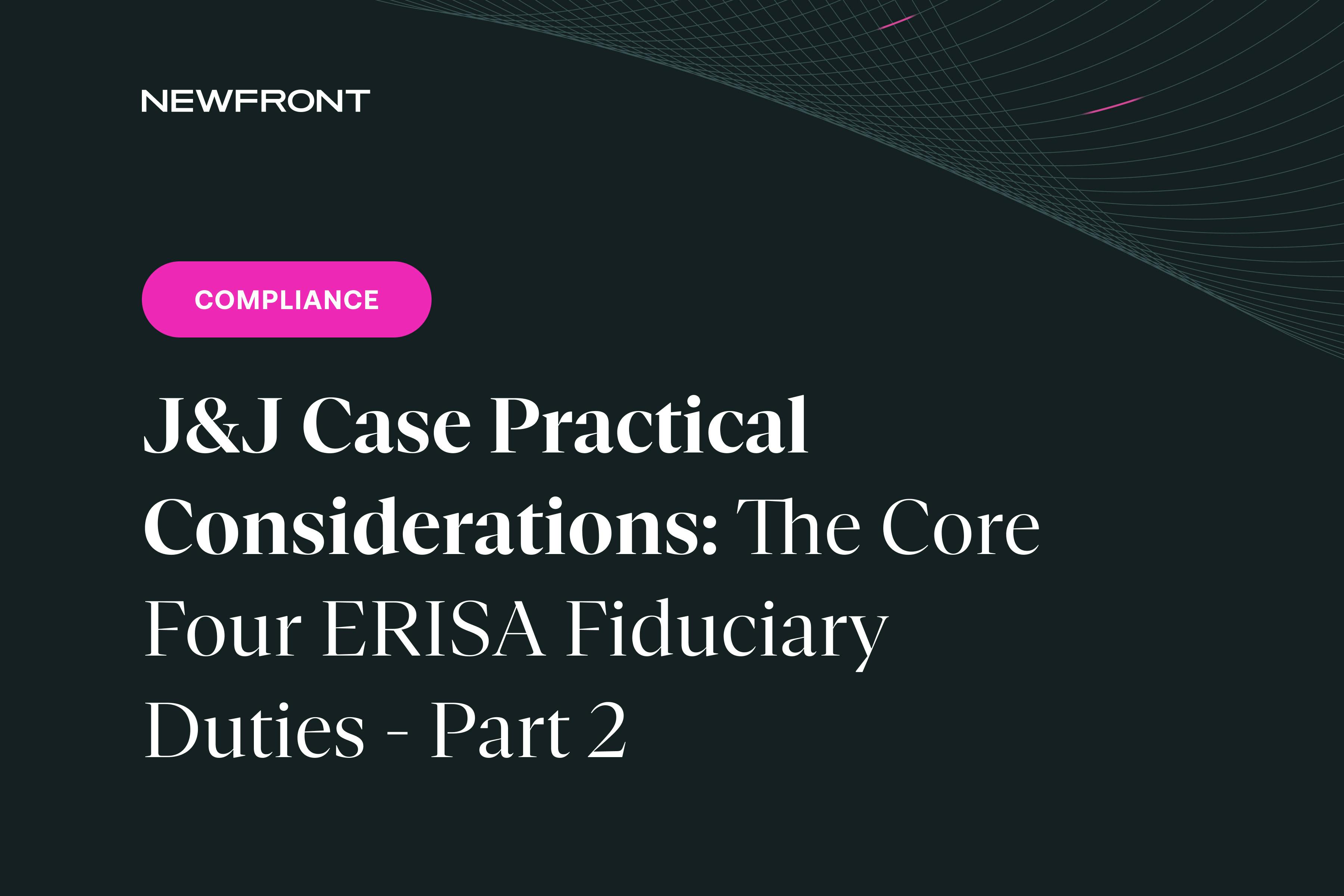Dependent Care FSA for Parents Who are Divorced, Separated, or Living Apart
By Brian Gilmore | Published August 2, 2019
**Question: **How do the dependent care FSA rules apply to parents who are divorced, separated, or living apart?
Compliance Team Response:
-
Dependent Care FSA Available Only to Custodial Parent
Where parents are divorced, separated, or living apart, only the custodial parent is permitted to utilize the dependent care FSA for the child’s day care expenses.
**The “custodial parent” is defined as the parent with whom the child resides for the greater number of nights during the calendar year. **
When the number of nights with each parent is the same, the parent with the higher adjusted gross income is treated as the custodial parent. Special rules also apply for determining the custodial parent where a child lives for a greater number of days, but not nights, with a parent because of the parent’s nighttime work schedule.
The noncustodial parent cannot utilize the dependent care FSA for the child even if the noncustodial parent is financially responsible for paying for the child’s care, the child lives with the noncustodial parent for some significant portion of the year, or the noncustodial parent can claim the child as a tax dependent.
Summary: Only the custodial parent can be reimbursed for the child’s daycare expenses under the dependent care FSA.
Written Declaration of Release Exception Does Not Apply to Dependent Care FSA
For certain tax purposes, a special rule applies where the custodial parent can sign a written declaration that he or she won’t claim the child as a dependent for the year. Where the noncustodial parent attaches the written declaration to his or her return, and all of the other applicable conditions are satisfied, the noncustodial parent can generally claim the child as a tax dependent and as a qualifying child for the child tax credit or the credit for other dependents.
However, this exception does not apply for purposes of the dependent care FSA. In other words, even if the noncustodial parent has attached the written declaration of release from the custodial parent to his or her tax return, that noncustodial parent still cannot utilize the dependent care FSA for the child’s daycare expenses. Again, only the “custodial parent” can have eligible daycare expenses for the dependent care FSA.
Where the Child Resides with Each Parent for a Portion of the Year
Where the child resides with each parent for part of the year, only the parent who is the “custodial parent” can have eligible dependent care FSA expenses for the child.
For example:
The custodial parent can have eligible daycare expenses for the period the child resides with the custodial parent (even if the noncustodial parent can claim the child as a tax dependent).
If the noncustodial parent pays for the daycare expenses while the child resides with the custodial parent (e.g., if required by the terms of the divorce decree), neither parent has eligible daycare expenses because the expenses were not incurred by the custodial parent.
If the noncustodial parent pays for the daycare expenses while the child resides with him or her, neither parent has eligible expenses because the noncustodial parent cannot have eligible expenses (even for the period of the year in which the child resides with the noncustodial parent).
If the custodial parent pays for the daycare expenses while the child resides with the noncustodial parent, neither parent has eligible daycare expenses for that period because the expense does not permit the custodial parent to work.
Determining Eligible Expenses
Ultimately, the determination as to whether the child’s expenses are eligible for reimbursement under the dependent care FSA is an individual income tax issue to be resolved by the employee through assistance with the employee’s personal tax advisor. Where in question, the employee should consult a personal tax advisor for assistance determining whether the child’s daycare expenses are eligible for dependent care FSA reimbursement.
The dependent care FSA’s third-party administrator will require the employee to certify that the expenses are eligible for reimbursement upon submitting a claim. However, unless the administrator has reason to believe that a participant does not qualify for reimbursement, there will be no further inquiry made by the administrator. The employee would be responsible for verifying the eligible expenses on the individual tax return (and if ever raised on audit of the individual tax return by the IRS).
Other Posts Addressing Dependent Care FSA Expenses
Summary
Where parents are divorced, separated, or living apart, only the custodial parent (generally the parent having custody for the greater portion of the calendar year) will have expenses eligible for reimbursement from the dependent care FSA.
Regulations
Treas. Reg. §1.21-1(b)(5):
(b) Qualifying individual.
…
(5) Special test for divorced or separated parents or parents living apart.
(i) Scope. This paragraph (b)(5) applies to a child (as defined in section 152(f)(1) for taxable years beginning after December 31, 2004, and in section 151(c)(3) for taxable years beginning before January 1, 2005) who—
(A) Is under age 13 or is physically or mentally incapable of self-care;
(B) Receives over one-half of his or her support during the calendar year from one or both parents who are divorced or legally separated under a decree of divorce or separate maintenance, are separated under a written separation agreement, or live apart at all times during the last 6 months of the calendar year; and
(C) Is in the custody of one or both parents for more than one-half of the calendar year.
(ii) Custodial parent allowed the credit. A child to whom this paragraph (b)(5) applies is the qualifying individual of only one parent in any taxable year and is the qualifying child of the custodial parent even if the noncustodial parent may claim the dependency exemption for that child for that taxable year. See section 21(e)(5). The custodial parent is the parent having custody for the greater portion of the calendar year. See section 152(e)(4)(A).
Treas. Reg. §1.152-4(d):
(d) Custodial parent.
(1) In general. The custodial parent is the parent with whom the child resides for the greater number of nights during the calendar year, and the noncustodial parent is the parent who is not the custodial parent. A child is treated as residing with neither parent if the child is emancipated under state law. For purposes of this section, a child resides with a parent for a night if the child sleeps–
(i) At the residence of that parent (whether or not the parent is present); or
(ii) In the company of the parent, when the child does not sleep at a parent’s residence (for example, the parent and child are on vacation together).
(2) Night straddling taxable years. A night that extends over two taxable years is allocated to the taxable year in which the night begins.
(3) Absences.
(i) Except as provided in paragraph (d)(3)(ii) of this section, for purposes of this paragraph (d), a child who does not reside (within the meaning of paragraph (d)(1) of this section) with a parent for a night is treated as residing with the parent with whom the child would have resided for the night but for the absence.
(ii) A child who does not reside (within the meaning of paragraph (d)(1) of this section) with a parent for a night is treated as not residing with either parent for that night if it cannot be determined with which parent the child would have resided or if the child would not have resided with either parent for the night.
(4) Special rule for equal number of nights. If a child is in the custody of one or both parents for more than one-half of the calendar year and the child resides with each parent for an equal number of nights during the calendar year, the parent with the higher adjusted gross income for the calendar year is treated as the custodial parent.
(5) Exception for a parent who works at night. If, in a calendar year, due to a parent’s nighttime work schedule, a child resides for a greater number of days but not nights with the parent who works at night, that parent is treated as the custodial parent. On a school day, the child is treated as residing at the primary residence registered with the school.
IRS Publication 503:
https://www.irs.gov/pub/irs-pdf/p503.pdf
Child of divorced or separated parents or parents living apart.
Even if you can’t claim your child as a dependent, he or she is treated as your qualifying person if:
The child was under age 13 or wasn’t physically or mentally able to care for himself or herself;
The child received over half of his or her support during the calendar year from one or both parents who are divorced or legally separated under a decree of divorce or separate maintenance, are separated under a written separation agreement, or lived apart at all times during the last 6 months of the calendar year;
The child was in the custody of one or both parents for more than half the year; and
You were the child’s custodial parent.
The custodial parent is the parent with whom the child lived for the greater number of nights in 2018. If the child was with each parent for an equal number of nights, the custodial parent is the parent with the higher adjusted gross income. For details and an exception for a parent who works at night, see Pub. 501.
The noncustodial parent can’t treat the child as a qualifying person even if that parent is entitled to claim the child as a dependent under the special rules for a child of divorced or separated parents.
IRS Publication 501:
https://www.irs.gov/pub/irs-pdf/p501.pdf
Parent works at night.
If, due to a parent’s nighttime work schedule, a child lives for a greater number of days, but not nights, with the parent who works at night, that parent is treated as the custodial parent. On a school day, the child is treated as living at the primary residence registered with the school.
IRS Notice 2006-86:
https://www.irs.gov/irb/2006-41_IRB#NOT-2006-86
The special rule of § 152(e) allows a noncustodial parent to claim the child as a qualifying child only for purposes of the child tax credit under § 24 and the dependency deduction under § 151. Section 152(e) does not apply to determinations under §§ 2(b), 21(b) and 129 (see § 21(e)(5)), and 32(c)(3).
…
If § 152(e) applies, a child may be treated as the qualifying child of two taxpayers. A noncustodial parent may claim the child as a qualifying child under § 152(e) only for purposes of the child tax credit under § 24 and the dependency deduction under § 151. However, the noncustodial parent may not claim the child as a qualifying child under § 152(e) in determining head of household filing status under § 2(b), the earned income credit under § 32, the child and dependent care credit under § 21, or the exclusion from income for dependent care assistance under § 129. Only the custodial parent (or other eligible taxpayer) may claim the child as a qualifying child for those purposes.

Brian Gilmore
Lead Benefits Counsel, VP, Newfront
Brian Gilmore is the Lead Benefits Counsel at Newfront. He assists clients on a wide variety of employee benefits compliance issues. The primary areas of his practice include ERISA, ACA, COBRA, HIPAA, Section 125 Cafeteria Plans, and 401(k) plans. Brian also presents regularly at trade events and in webinars on current hot topics in employee benefits law.
Connect on LinkedIn

